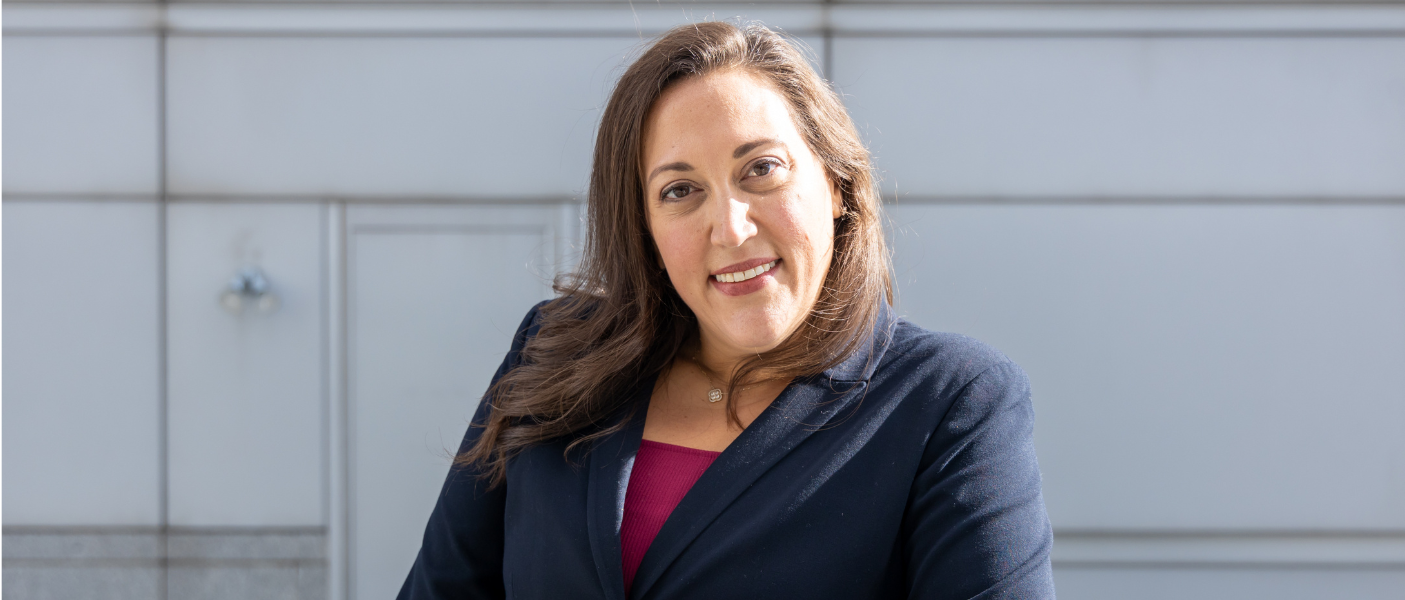

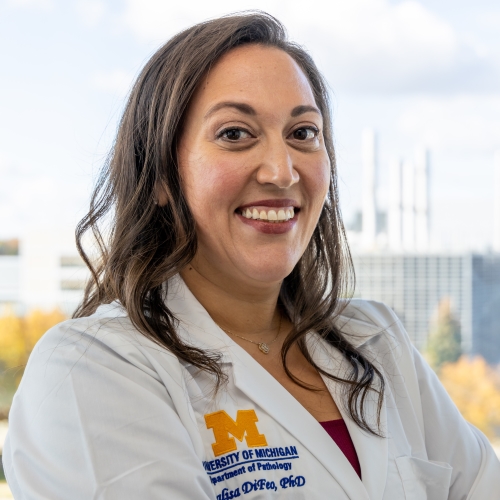 One of the greatest things about working in research at the University of Michigan Medical School is the people. The incredible students and the experts in every area with whom you can collaborate make the environment at Michigan one to be envied. One of these experts is Analisa DiFeo, PhD, professor of pathology and an ovarian cancer researcher.
One of the greatest things about working in research at the University of Michigan Medical School is the people. The incredible students and the experts in every area with whom you can collaborate make the environment at Michigan one to be envied. One of these experts is Analisa DiFeo, PhD, professor of pathology and an ovarian cancer researcher.
DiFeo is a first-generation Italian American who is extremely proud of her heritage. “My parents came here in the late 1960s, one by boat and one by plane, with literally $5 in their pockets, to give their future family an education they had always dreamed of. That motivated me as a child and continues to motivate me today as I mentor my students,” DiFeo recounted. At a time when most new immigrants were focused on assimilation into the American culture, DiFeo’s parents made sure she learned Italian and had an opportunity to visit Italy every summer so she could understand both cultures. “My parents sacrificed a lot to give us that opportunity. I am American, but the Italian culture is highly ingrained into who I am.”
DiFeo was born and raised in Long Island, New York, and after high school pursued a biochemistry degree at SUNY Binghamton. “But let me back up and tell you how I got there,” exclaimed DiFeo. DiFeo was a talented athlete, playing basketball throughout high school. She was being recruited by colleges, including the University of Connecticut. In her junior year of high school, she attended UConn’s basketball camp, led by coach Luigi “Geno” Auriemma. “That year, they had just won the college championship. I was at that camp when I tore my ACL. I did well academically, but basketball was my life. But, as I always say, everything happens for a reason.” It was at this time that DiFeo was thrown into the world of medicine for the first time. “I went to seven orthopedic surgeons because I didn’t want to have surgery, and because I was a stubborn high schooler. Some I liked, some I didn’t. I finally met one I really clicked with because he explained the rationale behind all his decisions, then proceeded to surgery. I was an analytical thinker, and I wanted to know the whole process – how they did it, why they did it, what tools they used, and why. The whole scientific process of it was important to me and it was at that point that I realized, I love science.”
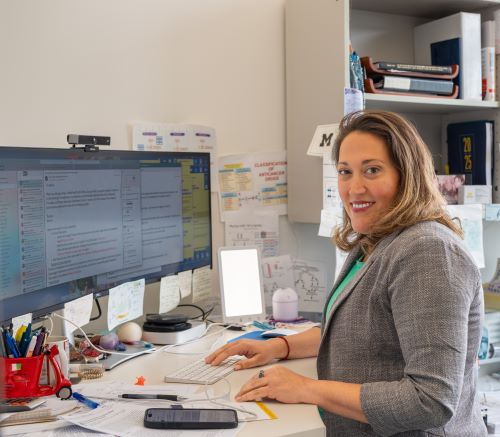 As a biochemistry major at SUNY Binghamton, DiFeo began doing biochemistry research, “and I hated it. It was basic research in plants. A lot of it was working in a greenhouse collecting seeds and performing enzymatic assays on the enzymes isolated from those seeds, and I did not see how we were applying the work or its greater impact on the world.” In her senior year, she attended a career fair and met a postdoctoral fellow from Mount Sinai Hospital in New York City who worked in the genetics department. “She introduced me to translational research and encouraged me to take a 'career year' to explore research in a translational research lab.” DiFeo decided to take her advice and emailed about 15 research faculty from Mount Sinai to see if she could work in their lab. “I targeted those with Italian-sounding last names because I didn’t have the pedigree. I had a good GPA and a biochemistry major, but I thought maybe they would be more inclined to hire me if they were Italian like me.” Two responded, one of whom was Dr. Giampero (John) Martignetti, a pediatrician-researcher. She worked in his lab for 2 years as a technician, then pursued a PhD in his lab for another four years. “I finished with 24 papers as a graduate student.”
As a biochemistry major at SUNY Binghamton, DiFeo began doing biochemistry research, “and I hated it. It was basic research in plants. A lot of it was working in a greenhouse collecting seeds and performing enzymatic assays on the enzymes isolated from those seeds, and I did not see how we were applying the work or its greater impact on the world.” In her senior year, she attended a career fair and met a postdoctoral fellow from Mount Sinai Hospital in New York City who worked in the genetics department. “She introduced me to translational research and encouraged me to take a 'career year' to explore research in a translational research lab.” DiFeo decided to take her advice and emailed about 15 research faculty from Mount Sinai to see if she could work in their lab. “I targeted those with Italian-sounding last names because I didn’t have the pedigree. I had a good GPA and a biochemistry major, but I thought maybe they would be more inclined to hire me if they were Italian like me.” Two responded, one of whom was Dr. Giampero (John) Martignetti, a pediatrician-researcher. She worked in his lab for 2 years as a technician, then pursued a PhD in his lab for another four years. “I finished with 24 papers as a graduate student.”
While working in the lab, two dear women in her family were diagnosed with ovarian cancer. While Martignetti did not work in ovarian cancer, he worked in genetics. “He allowed me to start looking at genetic factors of ovarian cancer. I really thank him for that confidence in me, that he let me explore that even though ovarian cancer and cancer biology were not necessarily his area of expertise.” She built a collaborative network with other surgeons and formed an ovarian cancer translational research program. After finishing her PhD, she was recruited to Case Western Reserve University and started her first lab as an assistant professor.
At Case Western, DiFeo found not many were engaged in ovarian cancer research, so she began to network with gynecologic oncologists, pathologists for collecting patient samples, and other researchers, and built a large translational research program in Cleveland. “Within five years, we banked over 300 specimens and made over 40 patient-derived xenograft (PDX) models and cell lines. We were very successful in recruiting a lot of labs to work in ovarian and endometrial cancer and also trained several PhD and MD/PhD students. Many great publications came out of that.” This endeavor also resulted in her selection as Crain’s Cleveland Business 40 Under 40 honoree.
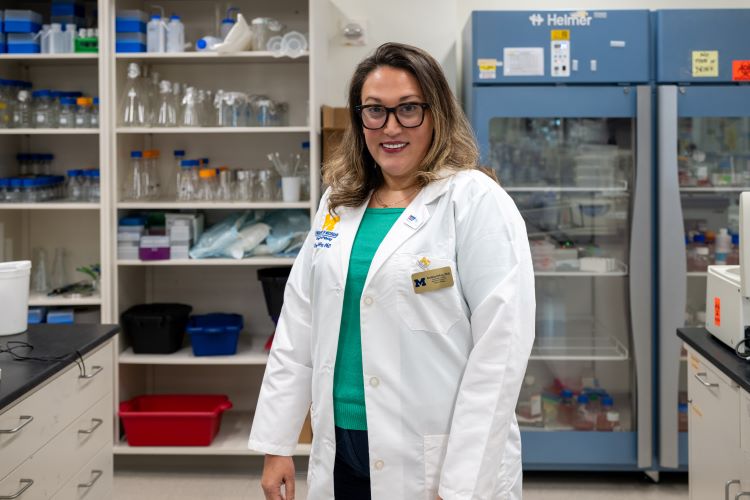 When the opportunity arose to move to Michigan, DiFeo relocated her lab. “U of M has an expert in almost every area. For example, we are now getting into metabolism. I would never have taken that on without the experts surrounding me, with whom I can collaborate. We are also looking at modifying small-molecule compounds that could possibly target microRNAs. I’m not a chemist, and I will never pretend to be one but there are very, very smart chemists around me who I can collaborate with, so now I feel confident to explore these areas.”
When the opportunity arose to move to Michigan, DiFeo relocated her lab. “U of M has an expert in almost every area. For example, we are now getting into metabolism. I would never have taken that on without the experts surrounding me, with whom I can collaborate. We are also looking at modifying small-molecule compounds that could possibly target microRNAs. I’m not a chemist, and I will never pretend to be one but there are very, very smart chemists around me who I can collaborate with, so now I feel confident to explore these areas.”
The most challenging aspect of research for DiFeo is managing the funding environment and keeping young trainees motivated to stay in research. “We have been fortunate to have philanthropic, industry, and internal funds, aside from NIH funding. However, I’m hoping that the NIH will continue to fund academic research, but it does cause some stress for the labs, and I see that in our trainees. Students are concerned about the job market when they hear about the funding issues. I tell them there will be a light at the end of the tunnel. They are going to find a position and be secure.” DiFeo’s mentorship effectiveness can be seen in the success of the students in her laboratory. She has had two Molecular and Cellular Pathology (MCP) graduate students graduate from her lab in the last two years, one more, Jessica Teitel, will defend her thesis in June, and she has two more MCP students still in her lab. So far, she has served on 33 thesis committees and graduated a total of 10 PhD students from her lab. In addition, Analisa has mentored 22 undergraduate students. One undergraduate student, Harini Ram, just won the Astronaut Award, the only University of Michigan student to do so. With this award, she will now be a part of the community of scholars and will have mentors for life from some very well-known scientists. She also won an award from the National Science Foundation and just received a Cancer Research Summer Internship Program (CaRSIP) Scholarship. “She is a remarkable undergraduate who, through her lab experience, has been inspired to pursue an MD/PhD. Her story is a powerful reminder of why we must make scientific research accessible and welcoming to individuals from all backgrounds.” DiFeo is also the Associate Director of the Cancer Biology Graduate Program and along with Dr. Maria Castro from Neurosurgery, is the co-Director of the T32 training grant in Tumor Microenvironment. “This T32 has been around for 32 years and was just renewed last September for another five years.”
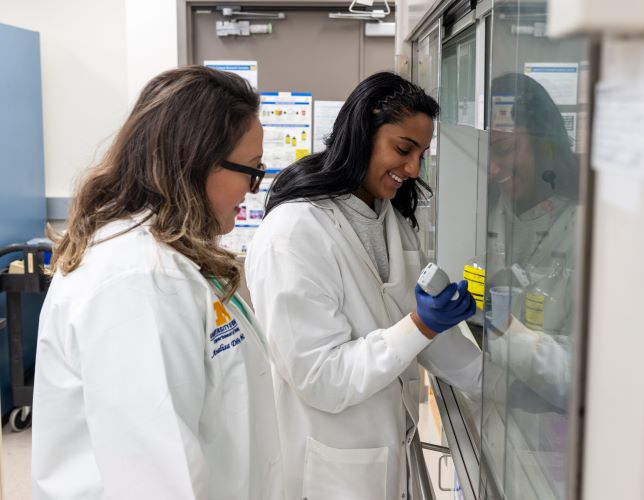 DiFeo doesn’t limit her interactions with just the University of Michigan; she leads a state-wide gynecologic translational research program started by Dr. Leigh Pierce, called MOSAIC (Michigan Ovarian Cancer Science and Innovation Consortium). This program brings together scientists, clinicians, pathologists, bioinformaticians, and chemists working on gynecologic cancers who meet monthly to discuss research projects and build collaborations that will hopefully benefit patient care. Furthermore, in collaboration with the Division of Gynecological Oncology and Dr. Zhen Ni Zhou she has built a gynecologic cancer tumor repository which includes over 500 tumor specimens and 60 patient-derived models.
DiFeo doesn’t limit her interactions with just the University of Michigan; she leads a state-wide gynecologic translational research program started by Dr. Leigh Pierce, called MOSAIC (Michigan Ovarian Cancer Science and Innovation Consortium). This program brings together scientists, clinicians, pathologists, bioinformaticians, and chemists working on gynecologic cancers who meet monthly to discuss research projects and build collaborations that will hopefully benefit patient care. Furthermore, in collaboration with the Division of Gynecological Oncology and Dr. Zhen Ni Zhou she has built a gynecologic cancer tumor repository which includes over 500 tumor specimens and 60 patient-derived models.
One of the newer areas of research for DiFeo incorporates Artificial Intelligence (AI) to help predict drug targets. “This is an exciting collaboration with industry, working with a company called Benevolent AI. One of the biggest issues with AI is it can predict many things, but how do you validate it? BenevolentAI reached out to request the use of our patient-derived models to help validate their AI predictions. “We recently published this work with Dr. Noah Puleo, a recent MCP graduate now conducting postdoctoral research at the University of Illinois in Chicago, where we identified two key molecular drivers of ovarian cancer and proposed a unique strategy to target them.”
In other drug discovery projects, the DiFeo lab collaborated with Dr. Goutham Narla to assess the efficacy of a novel class of drugs called PP2A Activators in the gynecological cancer patient-derived models developed in her lab. Just recently, this drug was licensed to SpringWorks Therapeutics for development in uterine cancers based on these studies, confirming that clinical translation is underway. “The reason I went into biomedical research is because I wanted to help patients. We are not there yet, but every little step can get you there. That is the point of a translational research lab. But to do that, you need to collaborate effectively. You cannot do it alone. You need to build those bridges with clinicians, industry partners, scientists who know things you don’t know, and most importantly, you need to know what you don’t know. If we think we know it all, we lose out. We won’t take that next step or build those relationships.”
First and foremost, however, DiFeo takes joy in her children. She has three children, boys ages 16 and 11, and a nine-year-old girl. “I really enjoy the fact that they know what I do, and they love it. I’m on the board of MIOCA, the Michigan Ovarian Cancer Alliance, which is the largest ovarian cancer foundation focused on survivors and supporting ovarian cancer research. My kids join me for the Mother’s Day run every year, and I love it! They wear their little DiFeo Lab t-shirts and understand the importance of research, what their mom does, and why. I am a better scientist because of them. If I am going to be away from my children, I’m going to make the most of every day in the lab.” Other than this, DiFeo enjoys simple things like being outside in good weather, gardening, dancing, and volleyball. “It all started with sports, and I still do sports. When my oldest was in 5th grade, I was asked to be his team’s basketball coach for Ann Arbor’s Rec and Ed. That was the biggest compliment!” “Also, during challenging moments in the lab—like a rejected paper or an unsuccessful grant—I draw on the mindset of an athlete: resilience, discipline, focus, and relentless hard work."